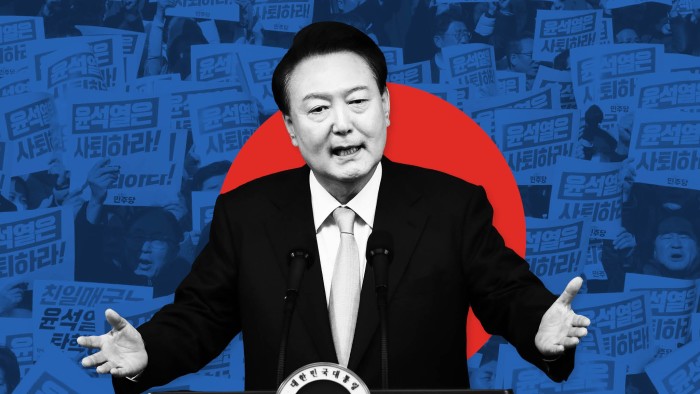Unlock the Editor’s Digest for free
Roula Khalaf, Editor of the FT, selects her favourite stories in this weekly newsletter.
South Korea has been thrown into political turmoil by President Yoon Suk Yeol’s failed attempt to impose martial law.
In an unscheduled broadcast late on Tuesday night, Yoon announced he was imposing a state of martial law. He accused the leftwing opposition majority in parliament of paralysing state activities and harbouring North Korean sympathies.
After South Korean troops stormed the National Assembly and skirmished with protesters and legislative aides, lawmakers voted to revoke the order. Yoon withdrew his decree hours later.
While the president’s office has defended the troop deployment to parliament, opposition parties have started a process to impeach Yoon and remove him from office, saying his action was unwarranted and amounted to “treason”.
How does the impeachment process work?
The South Korean constitution stipulates that an impeachment vote must be passed by a two-thirds majority in the 300-seat National Assembly.
Having submitted their impeachment motion to parliament, opposition lawmakers are holding hearings and questioning senior military officials and ministers. Lawmakers plan to hold the vote at 7pm on Saturday.
If an impeachment motion is passed, it must then be approved by the country’s Constitutional Court. In the meantime, the president is suspended from duties, and authority is passed to the prime minister on an interim basis.
Could Yoon survive the vote?
South Korea’s six opposition parties, all of which have called for Yoon’s impeachment, control 192 seats in the National Assembly, meaning they also need at least eight members of the ruling People Power party to support the motion.
Eighteen PPP members were among the lawmakers who rejected Yoon’s martial law decree, which has spurred opposition hopes that they can secure enough votes to pass the motion.
But on Thursday, PPP leader Han Dong-hoon said the party would oppose impeachment.
The earliest point at which opposition parties could stage a vote would be the early hours of Friday. But their decision to hold the vote on Saturday has fuelled speculation they need more time to secure the votes.
What role does the Constitutional Court play?
If lawmakers pass the impeachment motion, the country’s Constitutional Court makes the final decision.
In principle, seven out of nine judges on the court must convene to consider an impeachment, with a minimum of six required to approve it. They are supposed to deliver their verdict within 180 days of the parliamentary vote, but this time limit is not binding.
However, there are presently only six judges on the court, with three vacancies unfilled due to political gridlock and disputes among parties over the nomination process.
The court has said that in a situation with only six judges, a verdict in which they all participate would be binding. But this would require all six to approve impeachment and could be subject to challenge by Yoon and the PPP.
In order to avoid this situation, opposition parties could nominate more judges once the parliamentary vote has passed. But their nominations would have to be approved by the acting president, expected to be Yoon’s present prime minister, Han Duck-soo.
Observers note that the majority of judges on the court are conservative appointees, which may favour Yoon.
How long could this take?
The last president to be successfully impeached was the conservative Park Geun-hye, who was removed in 2017 following a bribery and influence scandal that triggered large street demonstrations.
In Park’s case, the Constitutional Court deliberated on her impeachment for three months before announcing a verdict. An election was then held two months after the ruling.
On this timetable, a Constitutional Court decision could come as early as March, with a presidential election in May.
If, instead of being impeached, Yoon were to resign, an election could be held as early as February.
If the impeachment motion does not pass and Yoon remains in office, the next election is due in 2027.
Read the full article here




